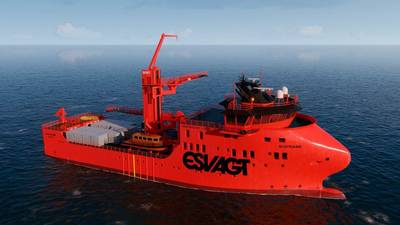ESVAGT Orders Two SOVs from Havyard

ESVAGT to provide two Service Operation Vessels, in the new 831L design for MHI Vestas. Photo: ESVAGT
Danish shipowner ESVAGT and offshore wind farm developer MHI Vestas have sealed long-term contracts for the delivery of two new service operation vessels (SOVs) for separate wind farms off the Netherlands and the U.K.
The wind farm service vessels will work the fields Borssele 3-4, located 22 km off the coast of Zeeland in the Netherlands, and Triton Knoll, which is 33 km off the coast of Lincolnshire in England, which together will produce 1,600 MW green energy from 2021. An option for an additional SOV for servicing the farm Moray East off the U.K. is also included. The contracts will run for up to 15 years.
ESVAGT has awarded the design and build contract to Norway's Havyard Design & Solution and Havyard Ship Technology. The vessels are scheduled to be delivered in Q3 2020 and Q1 2021.
The two new vessels will feature the new 831L design, encompassing both ESVAGT’s and MHI Vestas’ longstanding experience with offshore wind.
ESVAGT and MHI Vestas have cooperated on wind farm servicing for the past eight years, notably on the Belwind 1 and Nobelwind 1 offshore wind farm projects in Belgium. In 2017, the newly built SOV Esvagt Mercator began servicing these two wind farms for MHI Vestas.
Flemming Ougaard, COO at MHI Vestas, commented, “We build on many years of strong, innovative collaboration with ESVAGT. The combination of our shared knowledge will ensure a competitive and efficient green energy production for many years to come.”
Søren Karas, CCO at ESVAGT, commented, “We are proud to continue our close partnership, and together with MHI Vestas set the standard for innovation and long-term solutions. We look forward to presenting 831L as yet another customized SOV, in which we combine the client’s needs with our competencies and experience in order to guarantee the most optimal and cost-efficient solution.”
ESVAGT currently has five SOVs and a sixth in production. With the two new vessels, ESVAGT will have eight custom-designed SOVs. According to the newly appointed CEO, Peter Lytzen, this emphasizes ESVAGT’s growth ambitions in the wind market: “Loyal and innovative partnerships have allowed ESVAGT to develop into the market leader in offshore wind. Building on these relations is essential to achieving our ambitions in offshore wind,” he said.
According to ESVAGT, the new 831L SOVs will be the most efficient to date. ESVAGT has collaborated with Havyard in the design process, having previously worked with the firm on the development of the SOVs Esvagt Froude, Esvagt Faraday, Esvagt Njord and Esvagt Mercator.
"Havyard is particularly pleased that good customers have come back and placed orders with our yard in Leirvik. This shows that ESVAGT is very satisfied with the quality of the vessels we have delivered previously and that the yard in Norway is still competitive in specialised and advanced vessels, where quality, function, price and precise delivery are essential," said EVP of Havyard Ship Technology Lasse Stokkeland.
The 831L will be 70.5 meters long, with accommodation for up to 60 persons. The vessel is designed for maximum fuel efficiency and will be equipped with compensated walk-to-work gangway and ESVAGT’s specially designed daughter craft as well as multiple other features.
"The ship is designed to provide optimal positioning capabilities, and Havyard Design & Solutions has used some of the most advanced theoretical calculations to predict the vessel’s properties. Our long experience with this type of vessel has enabled us to produce a very high level of comfort and safety," said Havyard Design Manager Arve Leine.
The Dutch wind farm Borssele III-IV, located 31 km from the Netherlands’ southwest coast, will be 730 MW, covering an area of 122 km2. The British wind farm Triton Knoll, placed 33 km from the British east coast and covering 146 km2, will be 860 MW.
Moray East is located 22 km from the British coast and covers 295 km2. All farms will be equipped with MHI Vestas’ 9.5 MW turbine and will produce enough energy to power 1.8 million households annually.


